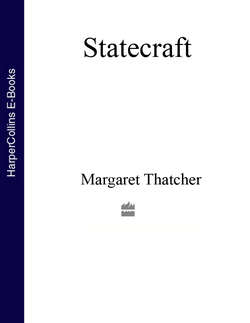Читать книгу Statecraft - Margaret Thatcher - Страница 22
THE BURDEN OF HISTORY
ОглавлениеThe best analyses of the Soviet Union were by and large those of historians rather than Sovietologists, because the historians had the benefit of perspective, while the Sovietologists had to glean most of their material from the turgid and mendacious statements of one or other Soviet authority. With Russia’s recent return to an older shape and identity, history is even more important as a basis for our assessments.*
It has been well-said that ‘of all the burdens Russia has had to bear, heaviest and most relentless of all has been the weight of her past’.† Russia might have developed differently. The course of history is not inevitable. But it is unarguably irreversible. One would have to go far back through the centuries to find a glimmer of any indigenous Russian tradition that might have spawned liberalism of the kind that has flourished in the West. From the late Middle Ages the tsars ruled their vast expanding domains in a fashion which explains much about modern Russia.
First, they recognised no property rights except their own, because they treated all their realm as if they owned it, and they regarded all secular lords as their tenants in chief. With no private property – above all, no private land – there could be no law, other than the tsar’s autocratic decrees. With no law, there could be no flourishing middle class, because there was lacking the security required for the accumulation of wealth, for the continuation of commerce and for the development of enterprise. Russian towns remained accordingly few, backward and small.
Secondly, the tsars admitted no institutional or even theoretical checks upon their power. They did not need to seek the consent of their subjects in order to raise revenues. Late-nineteenth- and early-twentieth-century Russian representative institutions thus had little resonance with most of the populace and were treated with scant respect by the tsar.
Thirdly, the tsars established an odd symbiotic relationship with the Russian Orthodox Church. On the one hand, the tsar exercised total control over it: the traditions of Orthodoxy – inherited from practice in Byzantium – were highly conducive to this, recognising no clear division between the ecclesiastical and political spheres. On the other hand, Russian Orthodoxy, claiming Moscow as ‘the third Rome’, deeply infused the whole Russian state with attitudes which were viscerally anti-Western.
These three elements combined uniquely with a fourth – the way in which Russia’s development as a state more or less coincided with its acquisition of an empire. Both were intricately connected for, to quote one leading authority, ‘since the seventeenth century, when Russia was already the world’s largest state, the immensity of their domain has served Russians as psychological compensation for their relative backwardness and poverty’.*
Westerners who visited tsarist Russia immediately knew that they had to deal with something utterly alien and un-European. More open-minded than those intellectuals who a century later made their pseudo-pilgrimages to the Soviet Union was the Marquis de Custine, who wrote his recollection of a visit to Russia in 1838. He went there as a sympathetic admirer of Russia; he returned an outraged critic:
The political state of Russia may be defined in one sentence: it is a country in which the government says what it pleases, because it alone has the right to speak. In Russia fear replaces, that is paralyses, thought … Nor in this country is historical truth any better respected than the sanctity of oaths … even the dead are exposed to the fantasies of him who rules the living.†
If this reads like a description of the Soviet communist dictatorship, that is more than coincidence; for it was grafted onto a Russian police-state tradition that was already well-established.
Custine’s picture of backwardness and repression is not, though, the whole story. The depredations which communism later made upon Russia – and even from its political coffin still makes – went far beyond anything devised by the tsars. Furthermore, economically at least, things had begun to change well before the Bolshevik Revolution. Russia’s belated but dynamic industrial revolution took off with a vengeance from the last decade of the nineteenth century. Indeed, as Norman Stone points out:
By [the eve of the First World War], Russia had become the fourth industrial power in the world, having overtaken France in indices of heavy industry – coal, iron, steel. Her population grew from just over sixty millions in the middle of the nineteenth century to a hundred millions in 1900 and almost 140 million by 1914; and that was counting only the European part, i.e. west of the Urals. Towns, which contained only ten million people in 1880, contained thirty million by 1914.*
Russia lacked the social and political institutions to cope with the strains of such rapid economic change. Moreover, the empire was about to enter a terrible war which exposed its weaknesses, and which led first to anarchy, then revolution, and finally to the imposition by the Bolsheviks of the most total dictatorship that the world has known.
